Uppsala Model and International Business
VerifiedAdded on 2020/01/28
|7
|2602
|38
Essay
AI Summary
This assignment delves into the Uppsala model, a framework for understanding how firms gradually expand their international operations. It examines the model's stages of internationalization, emphasizing the concept of 'psychic distance' – the perceived differences between a firm's home market and a target market. The analysis also highlights how businesses leverage the model to achieve sustainable development by considering cultural, political, and environmental factors in their expansion strategies.
Contribute Materials
Your contribution can guide someone’s learning journey. Share your
documents today.

GLOBAL MARKETING
Secure Best Marks with AI Grader
Need help grading? Try our AI Grader for instant feedback on your assignments.
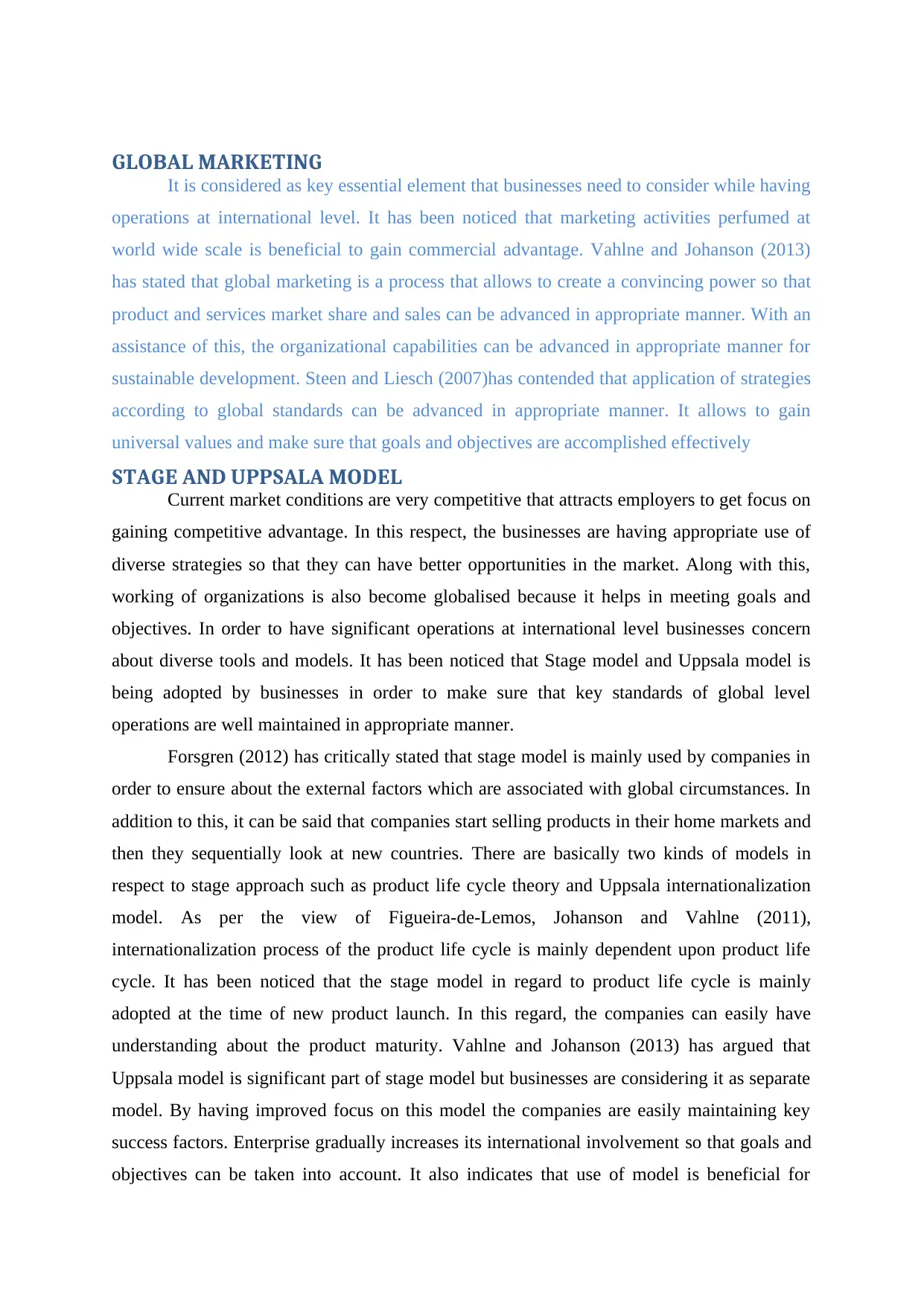
GLOBAL MARKETING
It is considered as key essential element that businesses need to consider while having
operations at international level. It has been noticed that marketing activities perfumed at
world wide scale is beneficial to gain commercial advantage. Vahlne and Johanson (2013)
has stated that global marketing is a process that allows to create a convincing power so that
product and services market share and sales can be advanced in appropriate manner. With an
assistance of this, the organizational capabilities can be advanced in appropriate manner for
sustainable development. Steen and Liesch (2007)has contended that application of strategies
according to global standards can be advanced in appropriate manner. It allows to gain
universal values and make sure that goals and objectives are accomplished effectively
STAGE AND UPPSALA MODEL
Current market conditions are very competitive that attracts employers to get focus on
gaining competitive advantage. In this respect, the businesses are having appropriate use of
diverse strategies so that they can have better opportunities in the market. Along with this,
working of organizations is also become globalised because it helps in meeting goals and
objectives. In order to have significant operations at international level businesses concern
about diverse tools and models. It has been noticed that Stage model and Uppsala model is
being adopted by businesses in order to make sure that key standards of global level
operations are well maintained in appropriate manner.
Forsgren (2012) has critically stated that stage model is mainly used by companies in
order to ensure about the external factors which are associated with global circumstances. In
addition to this, it can be said that companies start selling products in their home markets and
then they sequentially look at new countries. There are basically two kinds of models in
respect to stage approach such as product life cycle theory and Uppsala internationalization
model. As per the view of Figueira-de-Lemos, Johanson and Vahlne (2011),
internationalization process of the product life cycle is mainly dependent upon product life
cycle. It has been noticed that the stage model in regard to product life cycle is mainly
adopted at the time of new product launch. In this regard, the companies can easily have
understanding about the product maturity. Vahlne and Johanson (2013) has argued that
Uppsala model is significant part of stage model but businesses are considering it as separate
model. By having improved focus on this model the companies are easily maintaining key
success factors. Enterprise gradually increases its international involvement so that goals and
objectives can be taken into account. It also indicates that use of model is beneficial for
It is considered as key essential element that businesses need to consider while having
operations at international level. It has been noticed that marketing activities perfumed at
world wide scale is beneficial to gain commercial advantage. Vahlne and Johanson (2013)
has stated that global marketing is a process that allows to create a convincing power so that
product and services market share and sales can be advanced in appropriate manner. With an
assistance of this, the organizational capabilities can be advanced in appropriate manner for
sustainable development. Steen and Liesch (2007)has contended that application of strategies
according to global standards can be advanced in appropriate manner. It allows to gain
universal values and make sure that goals and objectives are accomplished effectively
STAGE AND UPPSALA MODEL
Current market conditions are very competitive that attracts employers to get focus on
gaining competitive advantage. In this respect, the businesses are having appropriate use of
diverse strategies so that they can have better opportunities in the market. Along with this,
working of organizations is also become globalised because it helps in meeting goals and
objectives. In order to have significant operations at international level businesses concern
about diverse tools and models. It has been noticed that Stage model and Uppsala model is
being adopted by businesses in order to make sure that key standards of global level
operations are well maintained in appropriate manner.
Forsgren (2012) has critically stated that stage model is mainly used by companies in
order to ensure about the external factors which are associated with global circumstances. In
addition to this, it can be said that companies start selling products in their home markets and
then they sequentially look at new countries. There are basically two kinds of models in
respect to stage approach such as product life cycle theory and Uppsala internationalization
model. As per the view of Figueira-de-Lemos, Johanson and Vahlne (2011),
internationalization process of the product life cycle is mainly dependent upon product life
cycle. It has been noticed that the stage model in regard to product life cycle is mainly
adopted at the time of new product launch. In this regard, the companies can easily have
understanding about the product maturity. Vahlne and Johanson (2013) has argued that
Uppsala model is significant part of stage model but businesses are considering it as separate
model. By having improved focus on this model the companies are easily maintaining key
success factors. Enterprise gradually increases its international involvement so that goals and
objectives can be taken into account. It also indicates that use of model is beneficial for
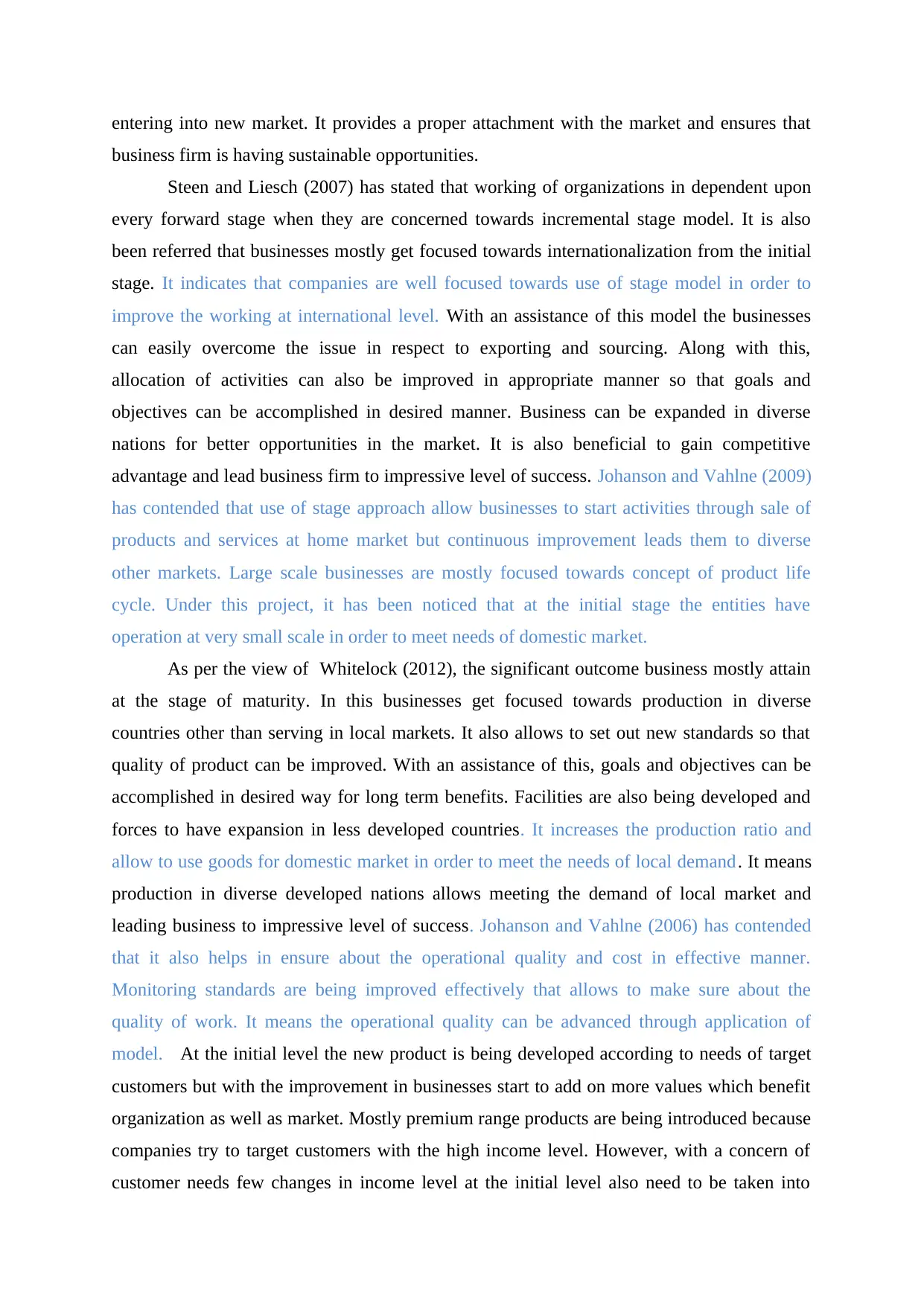
entering into new market. It provides a proper attachment with the market and ensures that
business firm is having sustainable opportunities.
Steen and Liesch (2007) has stated that working of organizations in dependent upon
every forward stage when they are concerned towards incremental stage model. It is also
been referred that businesses mostly get focused towards internationalization from the initial
stage. It indicates that companies are well focused towards use of stage model in order to
improve the working at international level. With an assistance of this model the businesses
can easily overcome the issue in respect to exporting and sourcing. Along with this,
allocation of activities can also be improved in appropriate manner so that goals and
objectives can be accomplished in desired manner. Business can be expanded in diverse
nations for better opportunities in the market. It is also beneficial to gain competitive
advantage and lead business firm to impressive level of success. Johanson and Vahlne (2009)
has contended that use of stage approach allow businesses to start activities through sale of
products and services at home market but continuous improvement leads them to diverse
other markets. Large scale businesses are mostly focused towards concept of product life
cycle. Under this project, it has been noticed that at the initial stage the entities have
operation at very small scale in order to meet needs of domestic market.
As per the view of Whitelock (2012), the significant outcome business mostly attain
at the stage of maturity. In this businesses get focused towards production in diverse
countries other than serving in local markets. It also allows to set out new standards so that
quality of product can be improved. With an assistance of this, goals and objectives can be
accomplished in desired way for long term benefits. Facilities are also being developed and
forces to have expansion in less developed countries. It increases the production ratio and
allow to use goods for domestic market in order to meet the needs of local demand. It means
production in diverse developed nations allows meeting the demand of local market and
leading business to impressive level of success. Johanson and Vahlne (2006) has contended
that it also helps in ensure about the operational quality and cost in effective manner.
Monitoring standards are being improved effectively that allows to make sure about the
quality of work. It means the operational quality can be advanced through application of
model. At the initial level the new product is being developed according to needs of target
customers but with the improvement in businesses start to add on more values which benefit
organization as well as market. Mostly premium range products are being introduced because
companies try to target customers with the high income level. However, with a concern of
customer needs few changes in income level at the initial level also need to be taken into
business firm is having sustainable opportunities.
Steen and Liesch (2007) has stated that working of organizations in dependent upon
every forward stage when they are concerned towards incremental stage model. It is also
been referred that businesses mostly get focused towards internationalization from the initial
stage. It indicates that companies are well focused towards use of stage model in order to
improve the working at international level. With an assistance of this model the businesses
can easily overcome the issue in respect to exporting and sourcing. Along with this,
allocation of activities can also be improved in appropriate manner so that goals and
objectives can be accomplished in desired manner. Business can be expanded in diverse
nations for better opportunities in the market. It is also beneficial to gain competitive
advantage and lead business firm to impressive level of success. Johanson and Vahlne (2009)
has contended that use of stage approach allow businesses to start activities through sale of
products and services at home market but continuous improvement leads them to diverse
other markets. Large scale businesses are mostly focused towards concept of product life
cycle. Under this project, it has been noticed that at the initial stage the entities have
operation at very small scale in order to meet needs of domestic market.
As per the view of Whitelock (2012), the significant outcome business mostly attain
at the stage of maturity. In this businesses get focused towards production in diverse
countries other than serving in local markets. It also allows to set out new standards so that
quality of product can be improved. With an assistance of this, goals and objectives can be
accomplished in desired way for long term benefits. Facilities are also being developed and
forces to have expansion in less developed countries. It increases the production ratio and
allow to use goods for domestic market in order to meet the needs of local demand. It means
production in diverse developed nations allows meeting the demand of local market and
leading business to impressive level of success. Johanson and Vahlne (2006) has contended
that it also helps in ensure about the operational quality and cost in effective manner.
Monitoring standards are being improved effectively that allows to make sure about the
quality of work. It means the operational quality can be advanced through application of
model. At the initial level the new product is being developed according to needs of target
customers but with the improvement in businesses start to add on more values which benefit
organization as well as market. Mostly premium range products are being introduced because
companies try to target customers with the high income level. However, with a concern of
customer needs few changes in income level at the initial level also need to be taken into
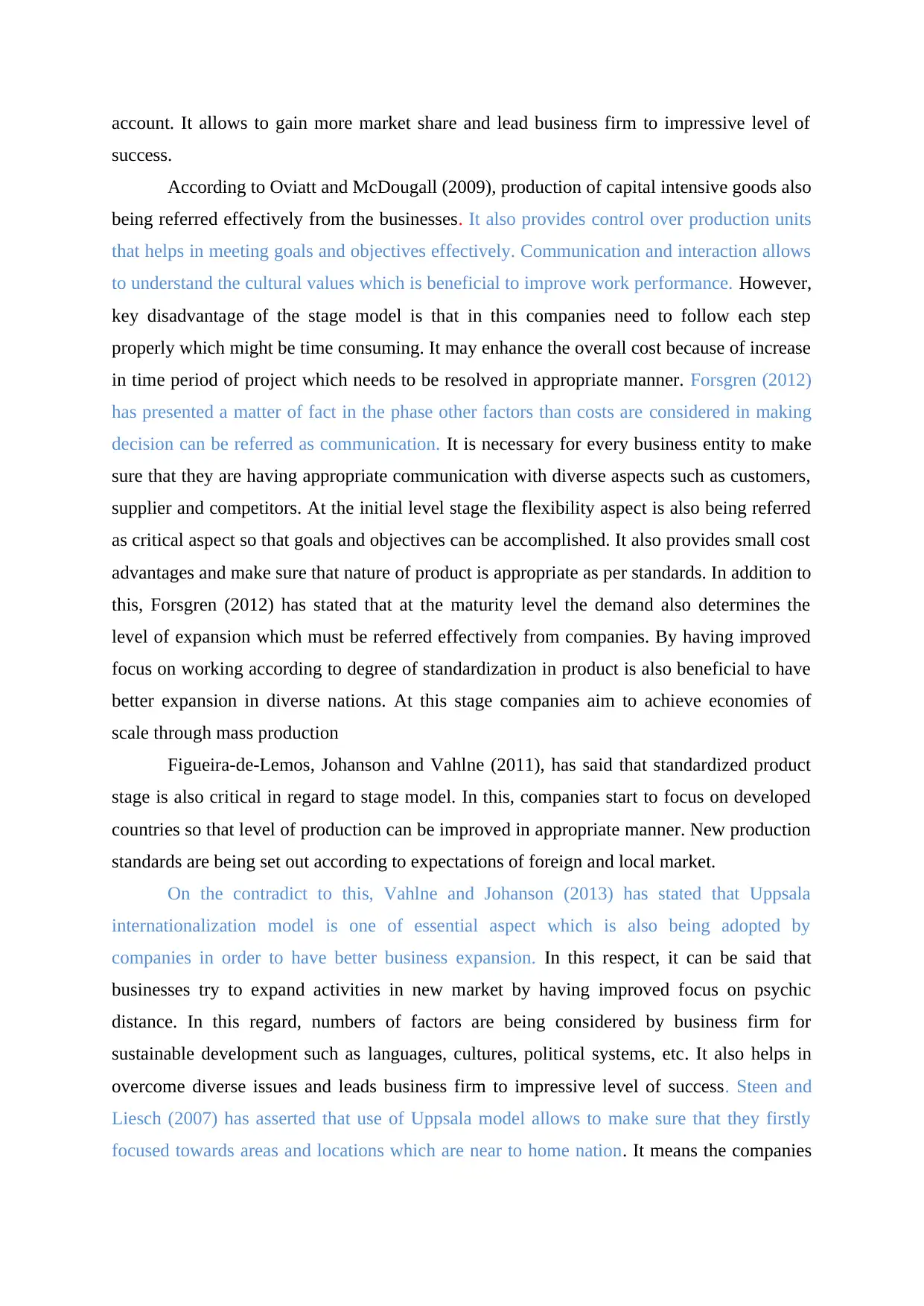
account. It allows to gain more market share and lead business firm to impressive level of
success.
According to Oviatt and McDougall (2009), production of capital intensive goods also
being referred effectively from the businesses. It also provides control over production units
that helps in meeting goals and objectives effectively. Communication and interaction allows
to understand the cultural values which is beneficial to improve work performance. However,
key disadvantage of the stage model is that in this companies need to follow each step
properly which might be time consuming. It may enhance the overall cost because of increase
in time period of project which needs to be resolved in appropriate manner. Forsgren (2012)
has presented a matter of fact in the phase other factors than costs are considered in making
decision can be referred as communication. It is necessary for every business entity to make
sure that they are having appropriate communication with diverse aspects such as customers,
supplier and competitors. At the initial level stage the flexibility aspect is also being referred
as critical aspect so that goals and objectives can be accomplished. It also provides small cost
advantages and make sure that nature of product is appropriate as per standards. In addition to
this, Forsgren (2012) has stated that at the maturity level the demand also determines the
level of expansion which must be referred effectively from companies. By having improved
focus on working according to degree of standardization in product is also beneficial to have
better expansion in diverse nations. At this stage companies aim to achieve economies of
scale through mass production
Figueira-de-Lemos, Johanson and Vahlne (2011), has said that standardized product
stage is also critical in regard to stage model. In this, companies start to focus on developed
countries so that level of production can be improved in appropriate manner. New production
standards are being set out according to expectations of foreign and local market.
On the contradict to this, Vahlne and Johanson (2013) has stated that Uppsala
internationalization model is one of essential aspect which is also being adopted by
companies in order to have better business expansion. In this respect, it can be said that
businesses try to expand activities in new market by having improved focus on psychic
distance. In this regard, numbers of factors are being considered by business firm for
sustainable development such as languages, cultures, political systems, etc. It also helps in
overcome diverse issues and leads business firm to impressive level of success. Steen and
Liesch (2007) has asserted that use of Uppsala model allows to make sure that they firstly
focused towards areas and locations which are near to home nation. It means the companies
success.
According to Oviatt and McDougall (2009), production of capital intensive goods also
being referred effectively from the businesses. It also provides control over production units
that helps in meeting goals and objectives effectively. Communication and interaction allows
to understand the cultural values which is beneficial to improve work performance. However,
key disadvantage of the stage model is that in this companies need to follow each step
properly which might be time consuming. It may enhance the overall cost because of increase
in time period of project which needs to be resolved in appropriate manner. Forsgren (2012)
has presented a matter of fact in the phase other factors than costs are considered in making
decision can be referred as communication. It is necessary for every business entity to make
sure that they are having appropriate communication with diverse aspects such as customers,
supplier and competitors. At the initial level stage the flexibility aspect is also being referred
as critical aspect so that goals and objectives can be accomplished. It also provides small cost
advantages and make sure that nature of product is appropriate as per standards. In addition to
this, Forsgren (2012) has stated that at the maturity level the demand also determines the
level of expansion which must be referred effectively from companies. By having improved
focus on working according to degree of standardization in product is also beneficial to have
better expansion in diverse nations. At this stage companies aim to achieve economies of
scale through mass production
Figueira-de-Lemos, Johanson and Vahlne (2011), has said that standardized product
stage is also critical in regard to stage model. In this, companies start to focus on developed
countries so that level of production can be improved in appropriate manner. New production
standards are being set out according to expectations of foreign and local market.
On the contradict to this, Vahlne and Johanson (2013) has stated that Uppsala
internationalization model is one of essential aspect which is also being adopted by
companies in order to have better business expansion. In this respect, it can be said that
businesses try to expand activities in new market by having improved focus on psychic
distance. In this regard, numbers of factors are being considered by business firm for
sustainable development such as languages, cultures, political systems, etc. It also helps in
overcome diverse issues and leads business firm to impressive level of success. Steen and
Liesch (2007) has asserted that use of Uppsala model allows to make sure that they firstly
focused towards areas and locations which are near to home nation. It means the companies
Secure Best Marks with AI Grader
Need help grading? Try our AI Grader for instant feedback on your assignments.
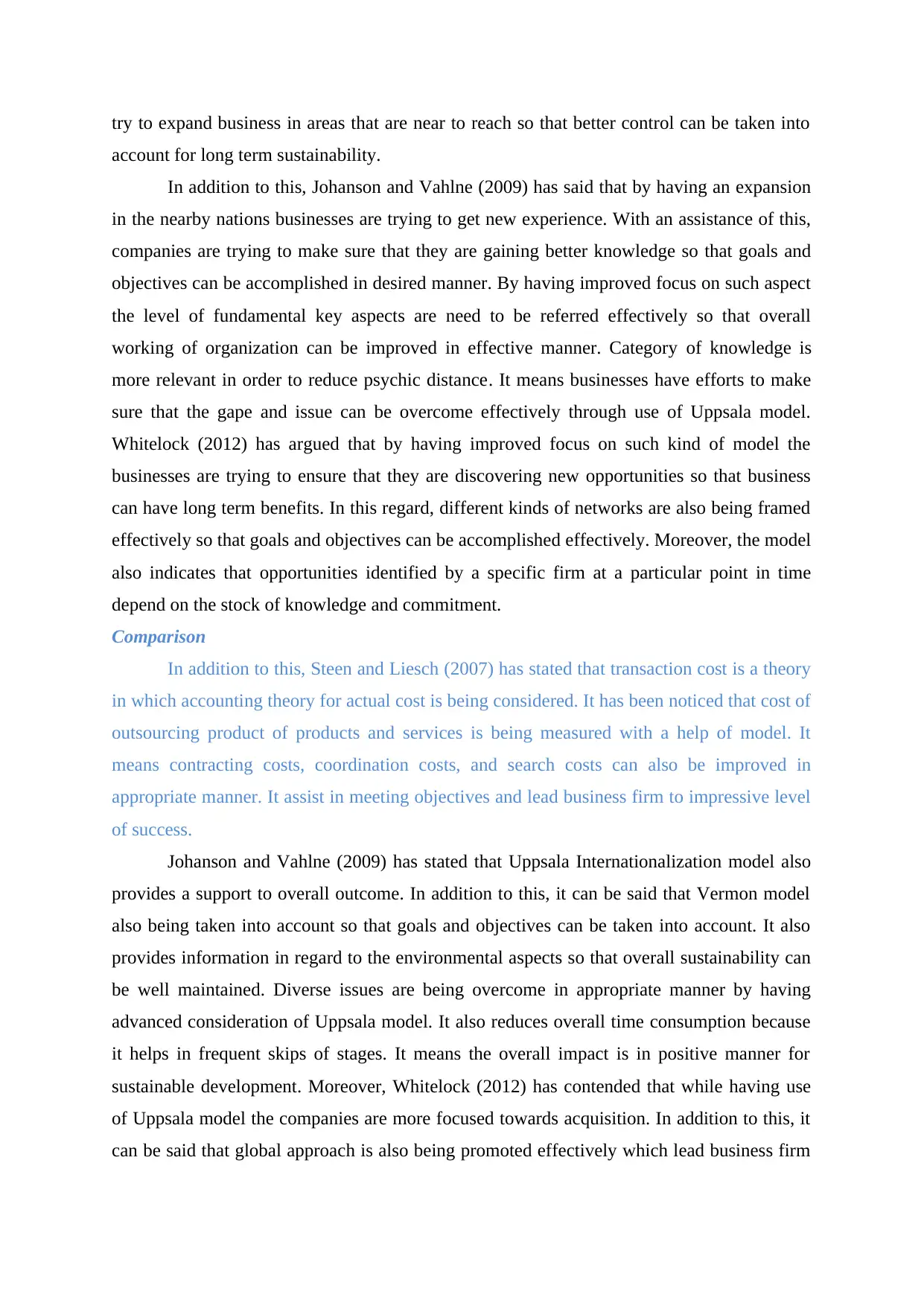
try to expand business in areas that are near to reach so that better control can be taken into
account for long term sustainability.
In addition to this, Johanson and Vahlne (2009) has said that by having an expansion
in the nearby nations businesses are trying to get new experience. With an assistance of this,
companies are trying to make sure that they are gaining better knowledge so that goals and
objectives can be accomplished in desired manner. By having improved focus on such aspect
the level of fundamental key aspects are need to be referred effectively so that overall
working of organization can be improved in effective manner. Category of knowledge is
more relevant in order to reduce psychic distance. It means businesses have efforts to make
sure that the gape and issue can be overcome effectively through use of Uppsala model.
Whitelock (2012) has argued that by having improved focus on such kind of model the
businesses are trying to ensure that they are discovering new opportunities so that business
can have long term benefits. In this regard, different kinds of networks are also being framed
effectively so that goals and objectives can be accomplished effectively. Moreover, the model
also indicates that opportunities identified by a specific firm at a particular point in time
depend on the stock of knowledge and commitment.
Comparison
In addition to this, Steen and Liesch (2007) has stated that transaction cost is a theory
in which accounting theory for actual cost is being considered. It has been noticed that cost of
outsourcing product of products and services is being measured with a help of model. It
means contracting costs, coordination costs, and search costs can also be improved in
appropriate manner. It assist in meeting objectives and lead business firm to impressive level
of success.
Johanson and Vahlne (2009) has stated that Uppsala Internationalization model also
provides a support to overall outcome. In addition to this, it can be said that Vermon model
also being taken into account so that goals and objectives can be taken into account. It also
provides information in regard to the environmental aspects so that overall sustainability can
be well maintained. Diverse issues are being overcome in appropriate manner by having
advanced consideration of Uppsala model. It also reduces overall time consumption because
it helps in frequent skips of stages. It means the overall impact is in positive manner for
sustainable development. Moreover, Whitelock (2012) has contended that while having use
of Uppsala model the companies are more focused towards acquisition. In addition to this, it
can be said that global approach is also being promoted effectively which lead business firm
account for long term sustainability.
In addition to this, Johanson and Vahlne (2009) has said that by having an expansion
in the nearby nations businesses are trying to get new experience. With an assistance of this,
companies are trying to make sure that they are gaining better knowledge so that goals and
objectives can be accomplished in desired manner. By having improved focus on such aspect
the level of fundamental key aspects are need to be referred effectively so that overall
working of organization can be improved in effective manner. Category of knowledge is
more relevant in order to reduce psychic distance. It means businesses have efforts to make
sure that the gape and issue can be overcome effectively through use of Uppsala model.
Whitelock (2012) has argued that by having improved focus on such kind of model the
businesses are trying to ensure that they are discovering new opportunities so that business
can have long term benefits. In this regard, different kinds of networks are also being framed
effectively so that goals and objectives can be accomplished effectively. Moreover, the model
also indicates that opportunities identified by a specific firm at a particular point in time
depend on the stock of knowledge and commitment.
Comparison
In addition to this, Steen and Liesch (2007) has stated that transaction cost is a theory
in which accounting theory for actual cost is being considered. It has been noticed that cost of
outsourcing product of products and services is being measured with a help of model. It
means contracting costs, coordination costs, and search costs can also be improved in
appropriate manner. It assist in meeting objectives and lead business firm to impressive level
of success.
Johanson and Vahlne (2009) has stated that Uppsala Internationalization model also
provides a support to overall outcome. In addition to this, it can be said that Vermon model
also being taken into account so that goals and objectives can be taken into account. It also
provides information in regard to the environmental aspects so that overall sustainability can
be well maintained. Diverse issues are being overcome in appropriate manner by having
advanced consideration of Uppsala model. It also reduces overall time consumption because
it helps in frequent skips of stages. It means the overall impact is in positive manner for
sustainable development. Moreover, Whitelock (2012) has contended that while having use
of Uppsala model the companies are more focused towards acquisition. In addition to this, it
can be said that global approach is also being promoted effectively which lead business firm
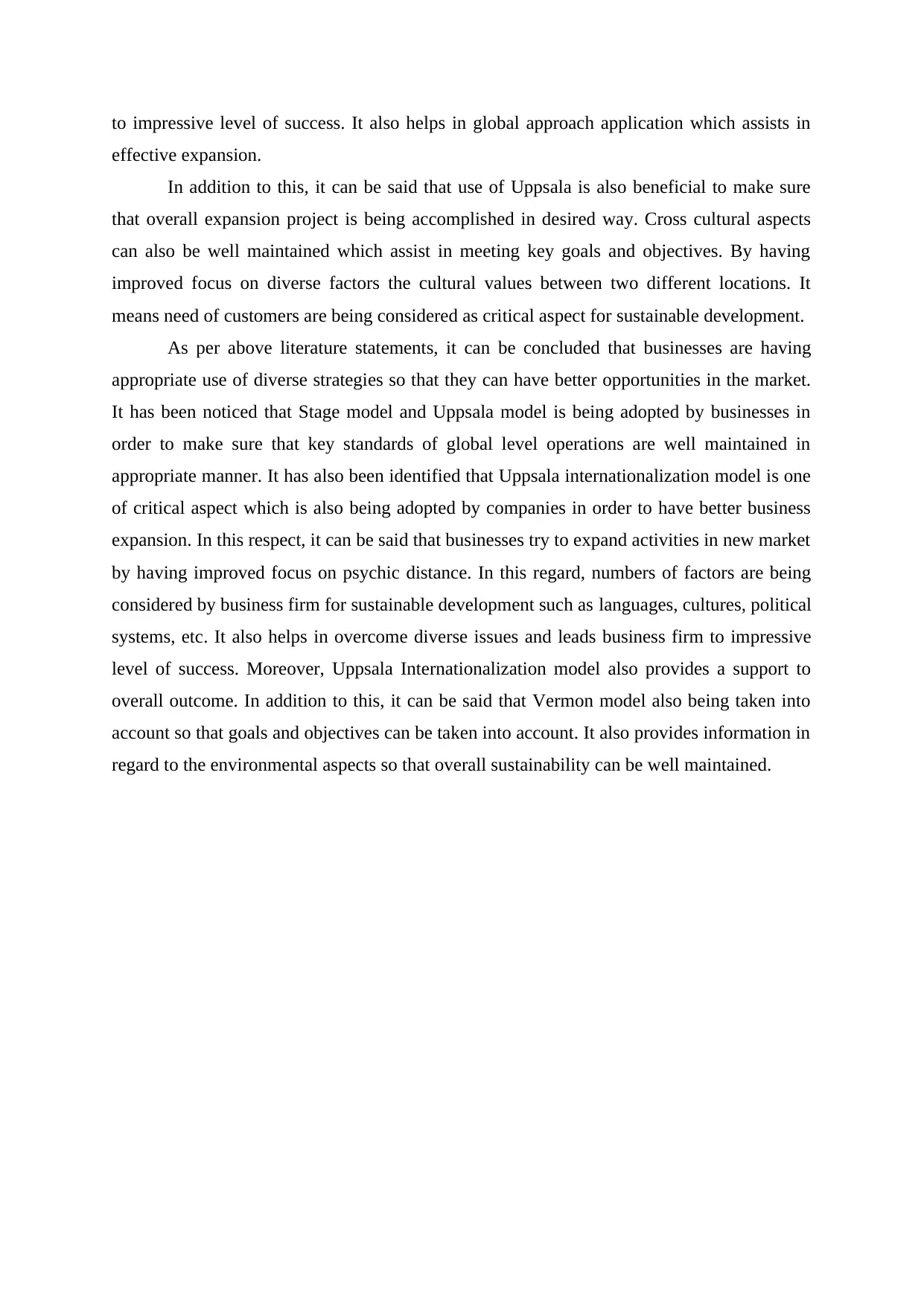
to impressive level of success. It also helps in global approach application which assists in
effective expansion.
In addition to this, it can be said that use of Uppsala is also beneficial to make sure
that overall expansion project is being accomplished in desired way. Cross cultural aspects
can also be well maintained which assist in meeting key goals and objectives. By having
improved focus on diverse factors the cultural values between two different locations. It
means need of customers are being considered as critical aspect for sustainable development.
As per above literature statements, it can be concluded that businesses are having
appropriate use of diverse strategies so that they can have better opportunities in the market.
It has been noticed that Stage model and Uppsala model is being adopted by businesses in
order to make sure that key standards of global level operations are well maintained in
appropriate manner. It has also been identified that Uppsala internationalization model is one
of critical aspect which is also being adopted by companies in order to have better business
expansion. In this respect, it can be said that businesses try to expand activities in new market
by having improved focus on psychic distance. In this regard, numbers of factors are being
considered by business firm for sustainable development such as languages, cultures, political
systems, etc. It also helps in overcome diverse issues and leads business firm to impressive
level of success. Moreover, Uppsala Internationalization model also provides a support to
overall outcome. In addition to this, it can be said that Vermon model also being taken into
account so that goals and objectives can be taken into account. It also provides information in
regard to the environmental aspects so that overall sustainability can be well maintained.
effective expansion.
In addition to this, it can be said that use of Uppsala is also beneficial to make sure
that overall expansion project is being accomplished in desired way. Cross cultural aspects
can also be well maintained which assist in meeting key goals and objectives. By having
improved focus on diverse factors the cultural values between two different locations. It
means need of customers are being considered as critical aspect for sustainable development.
As per above literature statements, it can be concluded that businesses are having
appropriate use of diverse strategies so that they can have better opportunities in the market.
It has been noticed that Stage model and Uppsala model is being adopted by businesses in
order to make sure that key standards of global level operations are well maintained in
appropriate manner. It has also been identified that Uppsala internationalization model is one
of critical aspect which is also being adopted by companies in order to have better business
expansion. In this respect, it can be said that businesses try to expand activities in new market
by having improved focus on psychic distance. In this regard, numbers of factors are being
considered by business firm for sustainable development such as languages, cultures, political
systems, etc. It also helps in overcome diverse issues and leads business firm to impressive
level of success. Moreover, Uppsala Internationalization model also provides a support to
overall outcome. In addition to this, it can be said that Vermon model also being taken into
account so that goals and objectives can be taken into account. It also provides information in
regard to the environmental aspects so that overall sustainability can be well maintained.
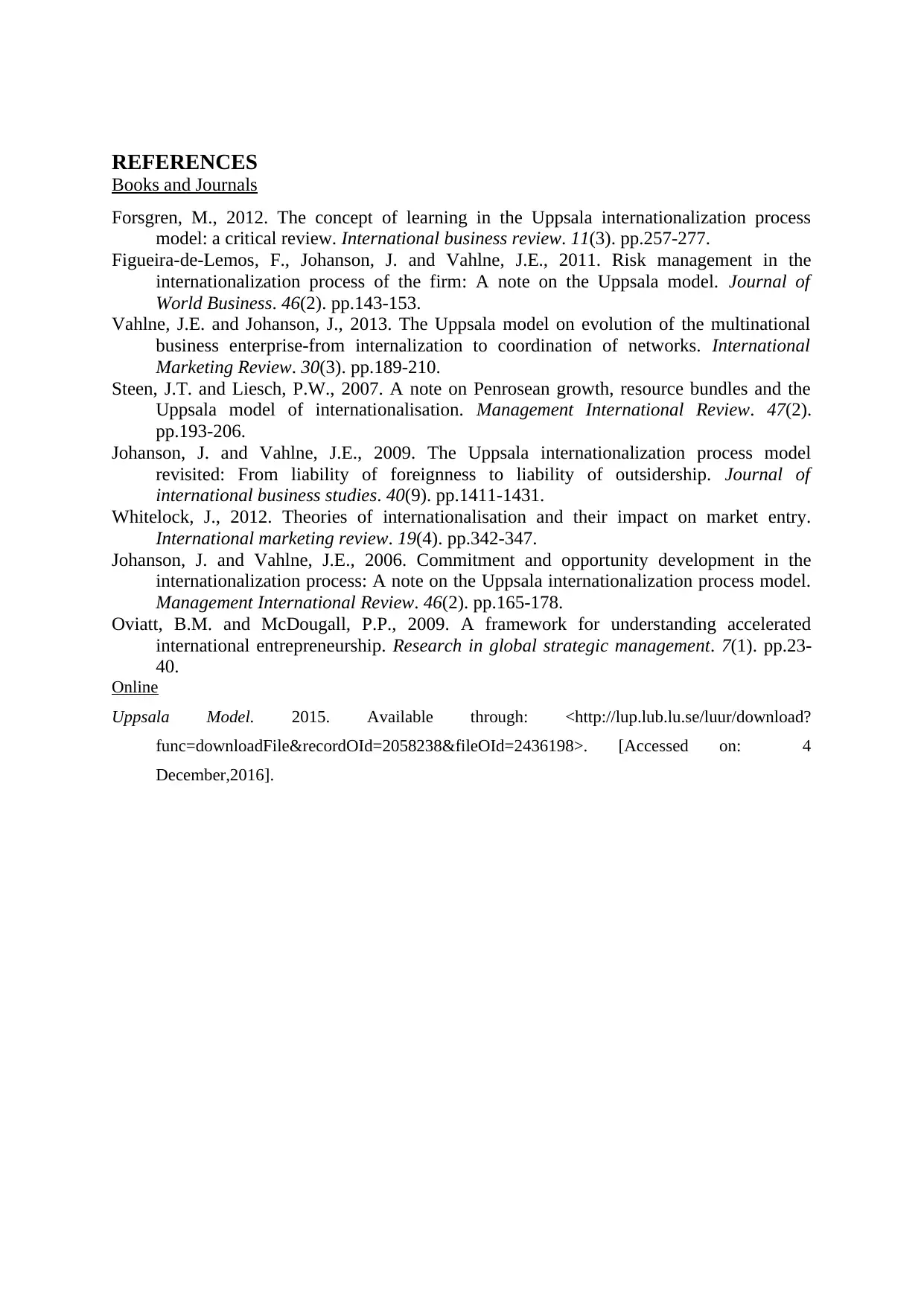
REFERENCES
Books and Journals
Forsgren, M., 2012. The concept of learning in the Uppsala internationalization process
model: a critical review. International business review. 11(3). pp.257-277.
Figueira-de-Lemos, F., Johanson, J. and Vahlne, J.E., 2011. Risk management in the
internationalization process of the firm: A note on the Uppsala model. Journal of
World Business. 46(2). pp.143-153.
Vahlne, J.E. and Johanson, J., 2013. The Uppsala model on evolution of the multinational
business enterprise-from internalization to coordination of networks. International
Marketing Review. 30(3). pp.189-210.
Steen, J.T. and Liesch, P.W., 2007. A note on Penrosean growth, resource bundles and the
Uppsala model of internationalisation. Management International Review. 47(2).
pp.193-206.
Johanson, J. and Vahlne, J.E., 2009. The Uppsala internationalization process model
revisited: From liability of foreignness to liability of outsidership. Journal of
international business studies. 40(9). pp.1411-1431.
Whitelock, J., 2012. Theories of internationalisation and their impact on market entry.
International marketing review. 19(4). pp.342-347.
Johanson, J. and Vahlne, J.E., 2006. Commitment and opportunity development in the
internationalization process: A note on the Uppsala internationalization process model.
Management International Review. 46(2). pp.165-178.
Oviatt, B.M. and McDougall, P.P., 2009. A framework for understanding accelerated
international entrepreneurship. Research in global strategic management. 7(1). pp.23-
40.
Online
Uppsala Model. 2015. Available through: <http://lup.lub.lu.se/luur/download?
func=downloadFile&recordOId=2058238&fileOId=2436198>. [Accessed on: 4
December,2016].
Books and Journals
Forsgren, M., 2012. The concept of learning in the Uppsala internationalization process
model: a critical review. International business review. 11(3). pp.257-277.
Figueira-de-Lemos, F., Johanson, J. and Vahlne, J.E., 2011. Risk management in the
internationalization process of the firm: A note on the Uppsala model. Journal of
World Business. 46(2). pp.143-153.
Vahlne, J.E. and Johanson, J., 2013. The Uppsala model on evolution of the multinational
business enterprise-from internalization to coordination of networks. International
Marketing Review. 30(3). pp.189-210.
Steen, J.T. and Liesch, P.W., 2007. A note on Penrosean growth, resource bundles and the
Uppsala model of internationalisation. Management International Review. 47(2).
pp.193-206.
Johanson, J. and Vahlne, J.E., 2009. The Uppsala internationalization process model
revisited: From liability of foreignness to liability of outsidership. Journal of
international business studies. 40(9). pp.1411-1431.
Whitelock, J., 2012. Theories of internationalisation and their impact on market entry.
International marketing review. 19(4). pp.342-347.
Johanson, J. and Vahlne, J.E., 2006. Commitment and opportunity development in the
internationalization process: A note on the Uppsala internationalization process model.
Management International Review. 46(2). pp.165-178.
Oviatt, B.M. and McDougall, P.P., 2009. A framework for understanding accelerated
international entrepreneurship. Research in global strategic management. 7(1). pp.23-
40.
Online
Uppsala Model. 2015. Available through: <http://lup.lub.lu.se/luur/download?
func=downloadFile&recordOId=2058238&fileOId=2436198>. [Accessed on: 4
December,2016].
1 out of 7
Related Documents
Your All-in-One AI-Powered Toolkit for Academic Success.
+13062052269
info@desklib.com
Available 24*7 on WhatsApp / Email
![[object Object]](/_next/static/media/star-bottom.7253800d.svg)
Unlock your academic potential
© 2024 | Zucol Services PVT LTD | All rights reserved.





